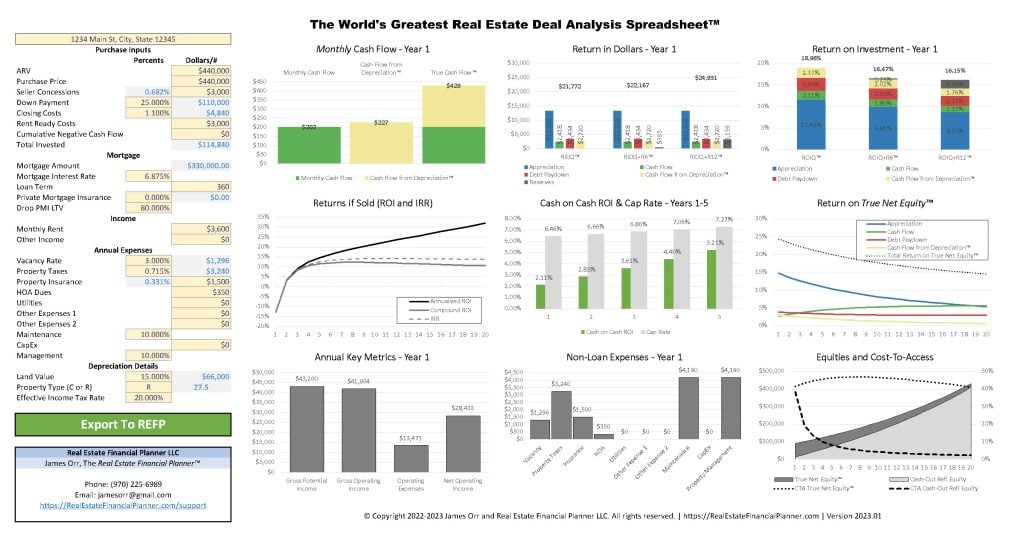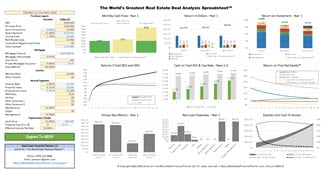Getting a mortgage is a critical step in the process of becoming a real estate investor. However, there are many factors to consider when preparing to apply for a mortgage, such as knowing and improving your credit score, optimizing your debt-to-income ratio, and building up your reserves. In this blog post, we’ll dive into the qualification requirements for getting a mortgage as a real estate investor and discuss strategies for preparing to apply for a mortgage.
Know and Improve Your Credit Score
When preparing to buy an investment property with a mortgage, it’s important to know and improve your credit score. Using free credit score websites such as CreditKarma.com can be a good place to start. While not exact, these websites can give you a good idea of what your credit score is and what factors are impacting it.
Lenders typically use your middle credit score, so it’s important to understand what that is and what goes into the calculation. You should request copies of all three credit reports and fix any inaccuracies or address any credit blemishes that may be impacting your score. Remember that things that improve your credit score are not always the logical or obvious choices. For example, closing an account may actually lower your score, and paying off everything may also lower it.
Improving your credit score can impact your mortgage interest rate, which in turn impacts your cash flow. The time to work on improving your credit score is well before you’re trying to apply for your mortgage. Some lenders are qualified to help you improve your score, while others may recommend hiring a respectable credit counselor.
It’s also important to protect your credit by locking it down until you’re ready to use it. This is a major asset in your ability to get mortgages and invest in real estate, and it’s something that you should take seriously. By knowing and improving your credit score, you can improve your chances of getting a favorable mortgage interest rate and achieving your real estate investing goals.
Optimize Your Debt-To-Income
One crucial factor to consider when preparing to buy an investment property with a mortgage is your debt-to-income ratio. This is a calculation that lenders use to determine if you qualify for a loan, and it is the ratio of how much debt you have in monthly payments compared to your income. The lower your debt-to-income ratio, the better, and it is important to understand what factors go into the calculation.
When modeling your investment property in the Real Estate Financial Planner™, your Debt-To-Income (DTI) over the entire modeling period is shown. This is an important measure of risk, and a lower DTI indicates less risk. It is important to understand how to calculate and improve your DTI, and you should work with your lender to determine what factors you can adjust to improve your ratio.
It is also worth noting that some strategies may have different levels of risk at different points in time. For example, a strategy may be risky early on but less risky later, while another strategy may have a moderate level of risk throughout the investment period. You should choose a strategy that aligns with your financial goals and risk tolerance.
In summary, understanding and improving your debt-to-income ratio is a crucial step in preparing to buy an investment property with a mortgage. Work with your lender to calculate your DTI and determine what factors you can adjust to improve it. Additionally, consider the level of risk associated with your chosen investment strategy and ensure that you are comfortable with it.
Save Money to Buy Your Investment Property
Saving money is a crucial step in preparing to buy an investment property with a mortgage. While many people focus on saving for the down payment, there are other expenses to consider as well. By saving strategically, you can improve your cash flow and make the most of your investment.
One of the most obvious expenses to save for is the down payment. Putting more money down can significantly improve your cash flow, so it’s important to save as much as you can. But there are other expenses to consider too, like closing costs and reserves.
Closing costs can be a significant expense when buying a property, so it’s important to save for them ahead of time. These costs typically include things like appraisal fees, title insurance, and attorney fees. By saving for these costs ahead of time, you won’t be caught off guard when it’s time to close on your property.
Reserves are another important expense to save for. This is money that is set aside to cover unexpected expenses, like repairs or vacancies. Lenders often require you to have a certain amount of reserves in order to qualify for a mortgage, so it’s important to save for this expense ahead of time.
In addition to these expenses, there are other ways to use your savings to improve your cash flow. For example, you can pre-pay PMI (private mortgage insurance) to eliminate the monthly expense. You can also buy down your interest rate, which can save you money over the life of your loan.
Negative cash flow is another expense to consider. While it’s not something you can save for directly, having a cushion of savings can help you weather periods of negative cash flow. By saving strategically, you can make sure you have the resources you need to succeed as a real estate investor.
Often Requested Mortgage Application Documents
When you’re preparing to apply for a mortgage to purchase an investment property, it’s important to understand the various documents that a lender might ask for. These documents are necessary to prove your financial stability and ability to make payments on the property.
Here is a comprehensive list of documents that you may need to provide to the lender:
- Loan application/personal financial statement: This document provides an overview of your financial situation, including your income, debts, and assets. It may also include information about your employment history, credit score, and other relevant financial details.
- Color copy of ID: You will need to provide a valid and current government-issued identification card, such as a driver’s license or passport.
- Recent W-2 and pay stubs: These documents provide proof of your income from your employer. They will typically show your earnings, taxes paid, and other deductions.
- Proof of any other sources of income: If you have income from other sources, such as rental income or investment income, you will need to provide documentation to prove it.
- Last 2 years of tax returns: This document provides a comprehensive look at your income, deductions, and tax liabilities over the past two years.
- All bank/investment/IRA account statements (1-3 months): These documents provide a snapshot of your financial accounts, including your checking, savings, investment, and retirement accounts. Lenders will typically want to see statements from the past 1-3 months.
- Documentation of where the down payment is coming from: You will need to show where the money for your down payment is coming from. This may include savings accounts, investment accounts, or gifts from family members.
- Documentation of any large deposits into your accounts: If you have recently received a large deposit into your account, you may need to provide documentation to prove where the money came from.
- Properties: Leases, Insurance, HOA, Mortgage Statements for all properties you own: If you already own other properties, you will need to provide documentation related to those properties. This may include leases, insurance policies, HOA documents, and mortgage statements.
- HUD-1 or Settlement statements from recent purchases: If you have recently purchased a property, you will need to provide documentation related to the purchase, such as a HUD-1 or settlement statement.
It’s important to note that different lenders may have slightly different requirements, so it’s a good idea to check with your lender to see if they require any additional documents.
It’s also important to ensure that you have these documents ready and organized to provide to the lender in a timely manner. You may want to consider creating a digital file that includes all of these documents, so that you can easily access them when needed.
In conclusion, when preparing to apply for a mortgage to purchase an investment property, it’s important to understand the various documents that a lender might ask for. By being prepared and organized, you can help ensure a smooth and efficient loan application process.
Organize Your Files
When it comes to buying an investment property with a mortgage, being organized can save you a lot of time and headaches. One of the first steps to take is to create a well-labeled, organized folder on a cloud storage service like Dropbox. This is where you can store all the files that your lender will likely request from you, such as tax returns, pay stubs, and property records.
It’s important to keep this folder updated as you receive new versions of these documents. This way, all the files you need to send to the lender are in one place, making it easier to access and share them as needed. This is especially helpful if you plan on getting loans regularly, as you can simply update the folder with the latest documents each time.
By staying organized with your documents, you can ensure a smoother and more efficient mortgage application process. So take the time to create a well-organized folder and keep it up to date with all the necessary documents. Your future self will thank you!
Prepare to Analyze Deals

Another thing to consider doing while preparing to get a mortgage to buy investment property is to get skilled at deal analysis. Consider using the free deal analysis spreadsheet: The World’s Greatest Real Estate Deal Analysis Spreadsheet™ to practice and be ready for when you’re buying your rental property.
Conclusion
In conclusion, preparing to get a mortgage to buy an investment property requires careful planning and organization. It’s important to understand the qualification requirements for getting a mortgage, know and improve your credit score, optimize your debt-to-income ratio, save money for the down payment and other expenses, and organize your financial documents. By following these steps, you can improve your chances of getting a favorable mortgage interest rate and achieving your real estate investing goals. Remember to start early, think strategically, and stay organized throughout the process. With the right preparation and mindset, you can successfully navigate the mortgage application process and become a successful real estate investor.


